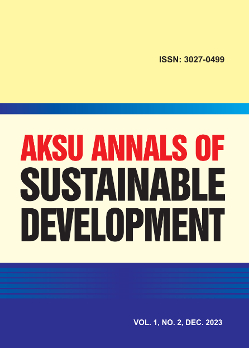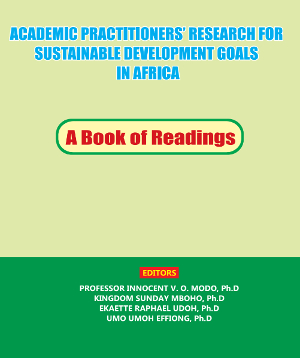JUNGLE JUSTICE IN AKWA IBOM STATE, NIGERIA: A FOCUS ON DRIVING FACTORS, PATTERNS, LEGAL FRAMEWORKS AND LAW ENFORCEMENT RESPONSE
DOI:
https://doi.org/10.60787/aasd.vol3no1.68Keywords:
Jungle Justice, Driving Factors, Patterns, Legal Frameworks, Law Enforcement ResponseAbstract
There are multiple incidences of jungle justices in Akwa Ibom State; without moral justification for this heinous crime. This study evaluated the motivating force, patterns, legal frameworks and law enforcement response to episodes of jungle justice in Akwa Ibom State, Nigeria. The investigation was guided by the assumptions of the social contract theory. A descriptive survey design was adopted in the investigation. Purposive and simple random sampling technique was employed and a total of 384 community leaders, law enforcement agents, human rights advocates and family members of victims of jungle justice in Uyo, Eket and Ikot Ekpene Local Government Areas in Akwa Ibom State formed the sample size. Structured questionnaire and in-depth interviews were methods of data gathering. Descriptive statistics were used to evaluate the quantitative data and thematic analysis was utilised to analyse qualitative data. Findings showed that factors that influence jungle justice include lack of trust in the police and legal institutions, ignorance of the law and legal rights, nature of allegations, absence of the police, frequency of crime, cultural acceptance of retaliation or community-enforced punishment, and serving as a deterrent to other members of the society. The patterns of jungle justice included burning with tyres and fuel, beating the defendants to death, stoning and lynching, stripping them nude and using dangerous weapons or items to harm the suspects. The current legislative frameworks against jungle justice were unable to checkmate incidences of jungle justice due to insufficient application of the laws and police response to alleged jungle justice was ineffective due to logistical and institutional deficiencies. It is recommended that concerted efforts be undertaken to re-establish public trust in the Nigeria Police Force (NPF) and the judicial system through transparent, responsible, and community-centred policing practices. In addition, extensive civic education initiatives that enhance understanding of legal rights, due process, and the risks of
extrajudicial punishment should be put into place. Increasing police presence and responsiveness, especially in underprivileged areas, and promoting more engagement between law enforcement and communities might help to lessen the perceived necessity for vigilante activities and increase the legitimacy of formal justice systems.
Downloads
References
Abang, T. A., Asangausung, O. S., & Mboho, K. S. (2025). Kidnapping in selected coastal communities of Akwa Ibom State: causes, effects and effectiveness of preventive strategies. AKSU Journal of Social Sciences (AKSUJOSS), 5(2), 30-54. https://doi.org/10.61090/aksujoss.2025.003
Abdulah, A. (2016, December 1). Jungle justice: a disregard for the rule of law. Vanguard. https://www.vanguardngr.com/2016
/12/jungle-justice-disregard-rulelaw/
Akan, K. A. (2023). Jungle justice as crime control mechanism among Nigerian youth: a pointer to the rising primitivism, fanaticism and anarchy. International Journal of Criminology and Security Studies (IJCSS), 1(1), 15-28.
Asangausung, O. S., Gboyeka, A. E. & Okorie, E. J.(2021). Special Anti-Robbery Squad (SARS) and human rights violation in
Akwa Ibom State, Nigeria. IOSR Journal of Humanities and Social Science (IOSRJHSS), 26(2), 29-38. https://doi.org/10.5281/zenodo.16729916
Asangausung, O. S., Mboho, K. S., Frank, N. S., Udousoro, T. E., & Ukpabio, M. E. (2023). The nexus between law, society and sustainable development. In I. V. O. Modo, K. S. Mboho, E. R. Udoh & U. U. Effiong (Editors). Academic Practitioners’ Research for
Sustainable Development Goals in Africa: A book of Readings (Pp. 187-193). International Centre for Integrated Development Research (ICIDR) Publishing House, Ikot Ekpene. https://doi.org/10.5281/zenodo.10665471
Asangausung, O. S., Abang, T. A., Oko, N. I., Okon, G. E., & Igbudu, J. W. (2024). An assessment of the challenges of public and private security organisations in Nigeria. AKSU Journal of Social Sciences (AKSUJOSS), 4(2), 134-146. https://doi.org/10.61090/aksujoss.2024.026
Balogun, O. S., Ifah, S. S., & Osisioma, U. C. (2023). Patterns and causes of mob justice in Nigeria. FUOYE Journal of Criminology and Security Studies (IJCSS), 2(2), 108-129.
Bassey, H. E., &Asangausung, O. S. (2023). Criminal justice actors and violations of human rights in Nigeria (2018-2023). Ibom Journal of Social Issues, 12(1), 33-41. https://doi.org/10.60787/ijsi.v12i1.48
Bassey, H. E., Asangausung, O. S., & Udousoro, T. E. (2024). Social forces militating against effective performance of security agencies in Nigeria. Ibom Journal of Social Issues, 13(1), 9-14. https://doi.org/10.60787/ijsi.v13i1.57
Bello, T. Y. (2019). Beyond the failing justice system: the emerging confluence of mob justice and social media in Nigeria. Democratic Communiqué, 28(2), 83-95.
Brown, A. S., Asangausung, O. S., James, N. N., & Bassey, A. E. (2024). Communitybased organisations and crime management in Nigeria: a study of rural and urban centres of Akwa Ibom State. AKSU Journal of Social Sciences (AKSUJOSS), 4(1), 1-13. https://doi.org/10.61090/aksujoss.2024.001
Daily Trust Editorial (2022, June 3). The unacceptable spate of jungle justice In Nigeria. Daily Trust. https://dailytrust.com/theunacceptable-spate-of-jungle-justice-innigeria/
Esara, U. V., Asuquo, M. E., Ekanem, A. E., & Etim, S. E. (2023). Jungle justice and governance in Akwa Ibom State, Nigeria. Global Journal of Communication and Humanities, 2(3), 20-30.
Essoh, P. A., Asangausung, O. S., & Willie, C. E. (2024). The causes and consequences of insecurity in northern Nigeria (2014-2024). International Journal of Social Sciences and Humanities Reviews, 14(3), 230- 247. https://doi.org/10.5281/zenodo.15951
Ilori, A. (2020). Jungle justice in Lagos metropolis, Nigeria. International Journal of Sociology and Anthropology, 12(3), 59-66.
International Federation of Female Lawyers (2019, February 13). FIDA Nigeria Statement condemning the growing trend of jungle justice meted out on women who have allegedly committed crimes. https://fida.org.ng/fida-nigeriastatement-condemning-the-growingtrend-of-jungle-justice-meted-out-onwomen-who-have-allegedlycommitted-crimes/
Ishola, A. V. (2024). Religious blasphemy, jungle justice and legal pluralism in northern Nigeria: a comparative analysis of the Nigerian 1999 Constitution and Sharia Law. African Journal of Law, Political Research and Administration, 7(2), 60-76.
Kapae, G., & Adishi, E. (2017). Jungle justice and criminal justice administration in Nigeria: the need for reform of the justice system. International Journal of Legal & Political Studies, 5(4), 15-20.
Kolawole-Amao, G. T. (2020). Effectiveness of the criminal justice system in tackling the menace of jungle justice in Nigeria. African Journal of Criminal Law and Jurisprudence (AFJCLJ), 5, 138-146.
Laws of the Federation (1999). The 1999 Constitution of the Federal Republic of Nigeria. Abuja, Nigeria.
Laws of the Federation (2004). Criminal Code Act. Federal Republic of Nigeria, Abuja.
Laws of the Federation (2004). Penal Code Act. Federal Republic of Nigeria, Abuja.
Law of the Federation of Nigeria (2015). Administration of Criminal Justice Act. https://www.policinglaw.info/assets/downloads/2015_Administration_of_Criminal_J ustice_Act.pdf
Mackintosh, U. C., Mackintosh, C. L., & Mazzi, U. J. (2024). The role of community policing in curbing jungle/mob justice in Rivers State. International Journal of Innovative Development and Policy Studies 12(2), 12-25.
Mac-Leva, F., Ibrahim, H., Mutum, R., & Oloyede, C. A. (2020, February 24). Jungle justice: 73 killed, 31 injured in one year. Daily Trust. https://dailytrust.com/jungle-justice-73-killed-31-njured-in-one-year/
Odey, P. (2021, September 24). Akwa Assembly passes resolution against jungle justice. The Punch. https://punchng.com/akwa-assemblypasses-resolution-against-junglejustice/
Onuh, A. (2012, April 7). Jungle justice: a vicious violation of human rights in Africa. Answer Africa Review. https://journalcra.com/sites/default/files/issue-pdf/48199.pdf
Ruwan, I. I. F., Ogechukwu, O. P., Fadare, C. G. O., & Garba, M. Y. (2020). Appraisal of jungle justice on the incidents of crime in Nigeria. KIU Journal of Social Sciences, 6(3), 135–145.
Salihu, H. A., & Gholami, H. (2018). Mob justice, corrupt and unproductive justice system in Nigeria: An empirical analysis. International Journal of Law, Crime and Justice, 55, 40-51.
Shodunke, A. O., Oladipupo, S. A., Alabi, M. O., & Akindele, A. H. (2023). Establishing the nexus among mob justice, human rights violations and the state: evidence from Nigeria. International Journal of Law, Crime and Justice, 72, 100573.
https://doi.org/10.1016/j.ijlcj.2022.100573.
Simwa, A. (2018). History of jungle justice in Nigeria. https://www.legit.ng/1147323-history-jungle-justice-nigeria.html
The Guardian Editorial (2022, May 12). Female student in Nigeria beaten to death over ‘blasphemy’. The Guardian. https://www.theguardian.com/world/2022/may/12/female-student-nigeriabeaten-to-death-sokoto
Udemezue, O. (2019). Pulse blogger: the irony of jungle justice. https://moonlightstorie.blogspot.com/2018/06/pulse-blogger-irony-ofjungle-justice.html.
Ukpong, C. (2021, February 18). Police in Akwa Ibom warn residents against jungle justice. Premium Times. https://www.premiumtimesng.com/regional/south-south-regional/443629-police-in-akwa-ibom-warn-residentsagainst-jungle-justice.html?tztc=1
Downloads
Published
Issue
Section
License
Copyright (c) 2025 AKSU Annals of Sustainable Development

This work is licensed under a Creative Commons Attribution-NonCommercial-NoDerivatives 4.0 International License.
Manuscript content on this site is licensed under Creative Commons Licenses. Authors wishing to include figures, tables, or text passages that have already been published elsewhere are required to obtain permission from the copyright owner(s) for both the print and online format and to include evidence that such permission has been granted when submitting their papers. Any material received without such evidence will be assumed to originate from the authors.





 ICIDR Publishing House
ICIDR Publishing House